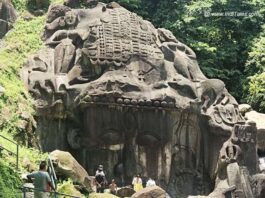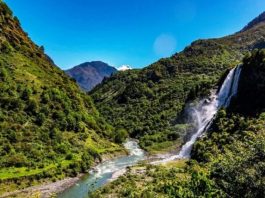Visiting Mechuka had been a dream ever since I saw the beautiful posts from this pristine valley of Arunachal Pradesh on various social media platforms. However, I had not envisioned it to come true so soon. When my invitation to Basar Confluence was confirmed, I was ecstatic to know that I will also be heading for another festival hosted by Adventure @ Mechuka with the same travel bloggers group.
Where is Mechuka?
It is situated at 6000 feet above sea level in the West Siang District of Arunachal Pradesh. It is also known as the Forbidden Valley of Arunachal Pradesh since it was inaccessible by road until 2003 when Dalai Lama visited the 400-year-old monastery. About 30 KMs from the McMahon line separating India and China. It was previously used as a strategic military landing strip during the Sino-Indian War of 1962.

After spending a week and sharing such beautiful moments together in Basar, we all had become one huge family. Even though it broke our hearts to leave Basar, we were looking forward to our next set of adventures together at the forbidden valley of Arunachal Pradesh which we had heard so much about. A traveler bus was arranged for our entire tour. Thus we set off early morning toward our destination. Normally, it takes around 9-10 hours to reach Mechuka from Basar.
We stopped a couple of times on the way for Tea and Lunch. The road from Basar goes via Along. The journey was a comfortable hilly ride with moderate road conditions. The highlight of the journey was, however, the snow-capped mountain that showed itself more with every turn we took, indicating how close we are to our destination.

How to reach Mechuka from Guwahati/Silapathar/Itanagar
- From Guwahati, one can board Lachit Express to Silapathar (9.5 hour’s journey) or Donyi Polo Express to Naharlagun.
- From Silapathar, shared taxis are available to Along (around 6 hours).
- And from Naharlagun, shared taxis are available to Itanagar (a 40-minute ride). Then change over to taxis heading towards Along (around 8 hours). Halt the night at Along. Book another shared taxi from Along which usually is available in the early morning (8-hour journey).
We were about to reach the town when our vehicle broke down. The weather was getting cold. We had to lock ourselves up until the driver arranged another vehicle for the rest of the journey. It was dark by the time we reached the village. But the moon was shining and the mountains glittered in its light. We turned in for the night at the homestays arranged for us. Looking forward to the days ahead with beautiful vistas that we had heard so much about.

Places to stay in Mechuka
Due to the recent influx of tourists in the valley, many families have opened up their homes as homestays with basic facilities. Some of them are – Gayboo’s traditional lodge, Grace homestay, Yargyap Chhu homestay, etc. All these are within walking distance of the town.
The team organized a 3-day festival. It was inaugurated by Salman Khan and the Honorable Minister of State for Home Affairs, Kiren Rijiju. The team organized various adventurous activities like Rafting, Kayaking, Paragliding, etc during the daytime. Evenings were reserved for cultural programs with performances by bands from different parts of the country. Since the days were very short (it gets dark by 4 PM), we decided to spend days exploring the valley. And enjoy the cultural shows at the event grounds in the evening.

Exploring Mechuka
The roads were beautiful with the myriad fall colors of the trees and followed the bluish Siyom/Siang river. The majestic river is one of the main tributaries of the mighty Brahmaputra and originates in Tibet.

Hanuman Camp

A viewpoint overlooking a hill with the natural formation of a face resembling Hanuman on it. Hanuman temple has also been built nearby. The natural architecture was possibly carved out due to erosion. But garnered the attention of all tourists as it truly resembled the face of the ardent devotee of Lord Ram in Indian mythology. This is also the last permanent camp of the army before the McMahon Line. The borderline separates the Tibetan region of China and the Northeast region of India. Yarlung, the border village in India is 25-30 KMs from the Hanuman camp.

Guru Nanak Taposthan and Gurudwara

The popular legend goes that Guru Nanak meditated on these spots on his way to Tibet. Two Gurudwaras were constructed in his honor (maintained by the Indian Army) by the Siyom River. There is a local story that Guru Nanak was once attacked by a wild bear while he was meditating. But the huge boulder under which he was meditating lifted him up and protected him. Another story goes that Guru Nanak once wanted to cross the river but there was a huge rock standing in his way. So, the rock got split into two, making a passage for him to pass. This thin passage is still available. It is said that only those true of the heart can pass through it, no matter what their body sizes are.

There is also a beautiful waterfall near the second Gurudwara in which the Guru was believed to have taken a bath. There was a small cavity filled with black and white pebbles, which lay hidden under the water. It is said that if a person picks a pebble and it turns out to be white, his wish is going to come true. And no matter how many times he tries thereafter, he/she will not be able to pick a pebble of a different color.

Samten Yongcha Monastery
The monastery was built in the 14th century atop a hill on the western edge of Mechuka Valley. We started our journey from the event grounds to the nearest base of the Monastery on a traveler. It is around 14 KMs from town. We had to get down near the bridge because the big vehicle could not drive up. Though smaller vehicles can go all the way. We walked up the hill though not strenuous it was a bit lengthy.

The road covered all the way with tall pine trees was beautiful which offered panoramic views at many points. We saw some blue-colored berries which we found to be edible (tangy in taste like gooseberry). Once we reached the top, the view took our breath away. I climbed up the stairs of the monastery. Sat down facing the valley with the bluish Siyom river flowing through just like a painting. I sat there for a long time, under the prayer flags. Others got busy exploring the monastery.

Guru Padmasambhava
Soon, I had to drag myself away to see what is inside the monastery. The ancient monastery has beautiful statues of Guru Padmasambhava, masks, traditional musical instruments, and prayers left by devotees.

The 400-year-old monastery is a two-storeyed building. Made entirely out of wood and has a divine old-world charm to it. There were some antique stone inscriptions stored inside. The monastery is believed to be older than the Tawang Monastery and is maintained by the local people. It is one of the most visited spots for locals and tourists alike.

Dzogchen Samten Choeling Monastery
The new monastery is situated close to the town. But failed to provide the charm of the older one.

Dorjeeling
Located about 12 KMs away Dorjeeling is a picturesque village with little wooden houses, farms, and blue streams. It is not a tourist spot. But a quaint little village where one can sit down and appreciate the surroundings. There is a small Buddhist Monastery in the village.
Sika Dido Waterfalls
The Siko Dido waterfalls in Irgo is a towering waterfall, surrounded by rocks covered in green moss. Though this waterfall lies on the way, it is worth stopping over.

Wooden Bridges and Wild Horses

These are a common sight around. Wild horses can be seen grazing lazily over the valley. The wooden bridges, held by steel wires are an absolute delight for photographers. Often overlooking the beautiful hills over the Siyom River.
Tribes

This place is home to the people of the Ramo (Adi), Memba, Bokar, and Libo tribes. They are believed to have Tibeto-Mongoloid origins. They follow various religions like Buddhism, Donyi-Poloism, and Christianity. And speak in Memba, Adi, Hindi, and English languages.
Best time to visit
The best time to visit is when the roads are not affected by the weather ie. post-monsoon months between October and March.
After spending three magical days, we set off for our return to our respective home cities. Since most of us had flights from Dibrugarh, we decided to leave for Pasighat and spend the night there. The Bogibeel Bridge, which was recently inaugurated by the Honorable Prime Minister of India, Shri Narendra Modi was not operational then. Hence we had to cross over to Dibrugarh via ferry from Bogibeel ghat. Sun was just dipping over the mighty Brahmaputra river coloring the sky and the river in all hues of orange.

Transportation to Dibrugarh
Take a shared taxi heading towards Along. Then take another shared taxi to Silapathar. Local taxis are available to and from Bogibeel Ghat. Ferry to and from Dibrugarh ply at regular intervals. However, with the inauguration of the Bogibeel Bridge, direct road transport options are also available between Dibrugarh and Silapathar.
Important points to remember
- Inner Line Permits (ILP) are absolutely necessary to enter and travel in Arunachal Pradesh. They are easily obtainable on arrival or online.
- Mobile networks are scarcely available. There is only a BSNL tower, which does not work sometimes. Only one PCO in the town in case of emergency.
- Carry warm clothes and proper shoes. Mercury goes down to sub-zero temperatures in winter with snowfall.
- Mainly Tibetan food is available. But one may get a few more options in the town. Recommended you carry some ready-to-eat meals if you have limited food preferences.
- It is better to carry cash before proceeding. There is only one State Bank of India ATM, which runs out of cash.
This is a guest post written by Priyam Kakoti Bora who represented IndiTales at Basar Confluence 2018




What a beautiful place. Wish to visit once in life.
Incredible place to visit. Nice post with great information and content. Thanks for Sharing!
May I know your travel Date please
it is so good to see someone’s experience in road trips
very interesting content
Mechuka is the place where I decided to leave my corporate job and started a Travel agency in 2018. The serenity of the place really captivated my inner consciousness and realized that I have to take a different path altogether. Thanks for such a beautiful blog.
I visited Mechuka in the month of March with a group of travelers from Mumbai. We all agreed that Darjeeling is the Best spot to visit in Meechuka.